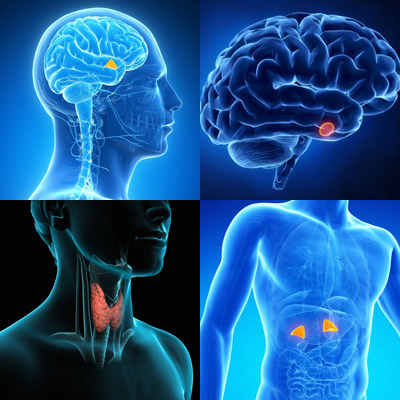- info@freakybullsfitness.com

Endocrinology

Endocrinology is the study of medicine that relates to the endocrine system, which is the system that controls hormones.
Endocrine system
The endocrine system is a messenger system comprising feedback loops of the hormones released by internal glands of an organism directly into the circulatory system, regulating distant target organs. In invertebrates, the hypothalamus is the neural control centre for all endocrine systems. In humans, the major endocrine glands are the thyroid gland and the adrenal glands. The study of the endocrine system and its disorders is known as endocrinology.
Glands that signal each other in sequence are often referred to as an axis, such as the hypothalamic-pituitary-adrenal axis. In addition to the specialized endocrine organs mentioned above, many other organs that are part of other body systems have secondary endocrine functions, including bone, kidneys, liver, heart and gonads. For example, the kidney secretes the endocrine hormone erythropoietin. Hormones can be amino acid complexes, steroids, eicosanoids, leukotrienes, or prostaglandins.
The endocrine system can be contrasted to both exocrine glands, which secrete hormones to the outside of the body, and paracrine signalling between cells over a relatively short distance. Endocrine glands have no ducts, are vascular, and commonly have intracellular vacuoles or granules that store their hormones. In contrast, exocrine glands, such as salivary glands, sweat glands, and glands within the gastrointestinal tract, tend to be much less vascular and have ducts or a hollow lumen. Endocrinology is a branch of internal medicine.
Hormones
Hormones are chemicals that affect the actions of different organ systems in the body. Examples include thyroid hormone, growth hormone, and insulin. The endocrine system involves a number of feedback mechanisms so that often one hormone such as thyroid-stimulating hormone will control the action or release of another secondary hormone such as thyroid hormone. If there is too much of the secondary hormone, it may provide negative feedback to the primary hormone, maintaining homeostasis.
In the original 1902 definition by Bayliss and Starling, they specified that to be classified as a hormone, a chemical must be produced by an organ, be released in small amounts into the blood, and be transported by the blood to a distant organ to exert its specific function. This definition holds for most "classical" hormones, but there are also paracrine mechanisms chemical communication between cells within a tissue or organ, autocrine signals a chemical that acts on the same cell, and intracrine signals a chemical that acts within the same cell. A neuroendocrine signal is a classical hormone that is released into the blood by a neurosecretory neuron
Griffin and Ojeda identify three different classes of hormones based on their chemical composition
Amines
Amines, such as norepinephrine, epinephrine, and dopamine (catecholamines), are derived from single amino acids, in this case, tyrosine. Thyroid hormones such as triiodothyronine T3 and tetraiodothyronine thyroxine, T4 make up a subset of this class because they derive from the combination of two iodinated tyrosine amino acid residues.
Peptide and protein
Peptide hormones and protein hormones consist of three in the case of the thyrotropin-releasing hormone to more than 200 in the case of follicle-stimulating hormone amino acid residues and can have molecular mass as large as 31,000 grams per mole. All hormones secreted by the pituitary gland are peptide hormones, as are leptin from adipocytes, ghrelin from the stomach, and insulin from the pancreas.
Steroid hormones
Steroid hormones are converted from their parent compound, cholesterol. Mammalian steroid hormones can be grouped into five groups by the receptors to which they bind glucocorticoids, mineralocorticoids, androgens, estrogens, and progestogens. Some forms of vitamin D, such as calcitriol, are steroid-like and bind to homologous receptors, but lack the characteristic fused ring structure of true steroids.
------------------
Endocrinologists
Endocrinologists are specially trained physicians who diagnose diseases related to the glands. Because these doctors specialize in these conditions, which can be complex and have hard-to-spot symptoms, an endocrinologist is your best advocate when dealing with hormonal issues.
Most patients begin their journey to the endocrinologist with a trip to their primary care provider. This doctor will run a series of tests to see the potential problem the patient faces. If a problem with the hormones is suspected, the primary care doctor will provide a referral. The endocrinologist's goal is to restore hormonal balance in the body.

